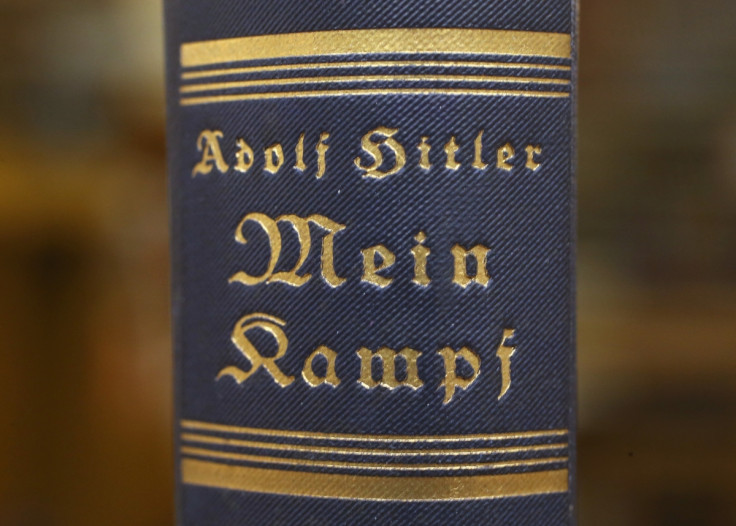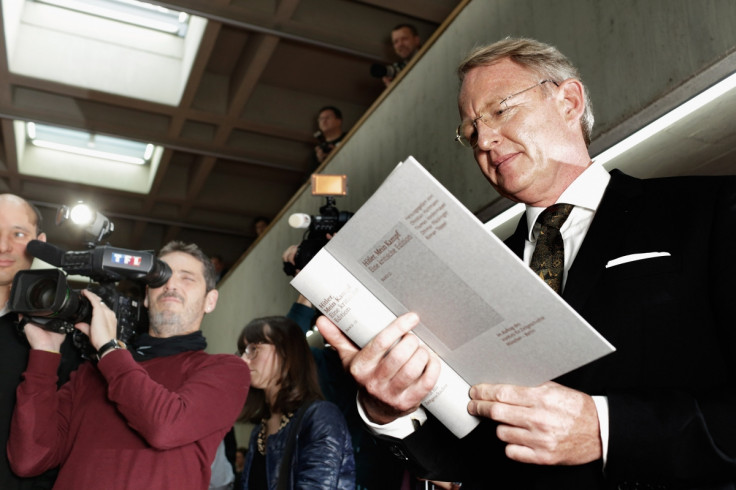Mein Kampf: How to read Adolf Hitler's psychotic Nazi 'bible' in today's troubled Europe

Reading Adolf Hitler's Mein Kampf was my struggle. I don't recommend you follow suit, no matter how noble your intentions. Written by the Nazi dictator during his stretch in the slammer in 1924, this guidebook for the misguided set out his psychotic anti-Semitic manifesto and served as his masterplan for mass murder.
Hitler was as gifted with pen as he was with paintbrush. If I had to write a dust jacket quote I'd say the author's debut novel was "shouty at best". If you're after a more erudite book for the beach, Being Reem by Joey Essex is now available in paperback.
But, credit where it's due, the bastard certainly had a way of putting his feelings on paper. According to Adie, Jews were (Here comes the science bit...) "parasites, liars, dirty, crafty, sly, spongers, middlemen, maggots, blood suckers, monsters...". You get the idea.
It's been banned in Germany since 1945 (Mein Kampf, not Being Reem). But that changed at the end of 2015 when copyright elapsed 70 years after the author's death and the book entered the public domain, leaving the government with a big decision to make.
It would have enraged libertarians with an indefinite ban, sparking debates on free speech and state censorship; or caused a Fuhrer free-for-all by allowing neo-Nazis to exploit its open distribution. So instead it went for a smart third option – issuing a brand new academic edition containing expert analysis from the country's Institute for Contemporary History.

The idea is to transform the most dangerous nonsense ever committed to paper into a lesson from history; to provide an educational tool for school and university students to reflect on where racism leads the human race, and how we as individuals respond to it. It's less about polishing a turd than explaining why it is one.
This whopping 2,000-pager (with 3,700 annotations), went on sale last week. It's currently in the non-fiction best-sellers chart after the initial 4,000 print-run sold out in days.
Of course, a cursory glance at Europe today shows the lessons it was supposed to have learned from Mein Kampf about confronting race hate, anti-Semitism, bigotry and prejudice remain unheeded. Hitler's spiritual heirs are a clear and present danger across the continent, particularly in the shape of Golden Dawn in Greece, the Jobbik Party in Hungary, Front National in France, Freedom Party in Austria and, indeed, the National Democratic Party in Germany.
Many of these parties now cloak their contempt beneath a veneer of respectability. Former BNP chairman Nick "Holohoax" Griffin, for instance, disputed his party's fascist credentials, claiming it had been "demonised" and "lied about". Britain First, the new flavour of the month in UK far-right politics, which wants to ban Islam from the UK, is headed by a young PR-savvy lady called Jayda Fransen, whose charisma and appeal has generated more than one million Facebook followers (The Conservative Party has half that number).
So the republication of Mein Kampf – a book so profoundly linked with the rise of anti-EU nationalism – comes at a pivotal time for pre-referendum Britain and the rest of Europe.
While the book has been outlawed in Germany since the end of the war, it's been flying off bookshelves around the world for decades. It's a best-seller in Turkey (President Recep Tayyip Erdogan is said to have carried a copy around with him as a student), and is widely distributed in India, Bangladesh and across the Middle East. Simply put, it does well wherever Anne Frank struggles to find an audience.
A recent surge in e-book sales saw it top Amazon's Propaganda and Political Psychology chart, while a free e-book version has been downloaded 100,000 times from archive.org. It also has a morbid hold on Nazi memorabilia hunters; an autographed copy signed by the author recently sold for £40,000 at a US auction.
So Mein Kampf's place in history is assured. It will always be read. The question is, how will it be read? And to what effect? Left to its own devices, it is an powerful tool for promoting misanthropy and murder. Put under the microscope, its transparent nonsense is effortlessly dismantled by sense and reason. Making this welcome new academic version the ultimate in tome improvement.
Richard Ferrer has been the editor of the Jewish News since 2009.
© Copyright IBTimes 2025. All rights reserved.





















